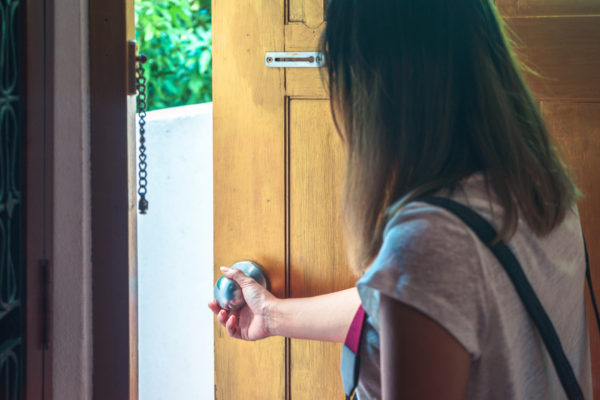
You have cancer. You loved one has cancer. You are in a cancer support group. You give to cancer research. You want a cure for cancer. You join a cancer bereavement group. Cancer impacts your identity.
Cancer sure has a lot of power over your life. Cancer, the diagnosis, may be inside you or your loved one’s body. That’s Mother Nature’s deadly mischief. She does have that power. But cancer, the identity, is a choice. How are you participating in that choice? How free does society make it for you to realize it’s a choice?
Even before prognosis and treatment options rise to view, the toll of cancer’s uninvited diagnosis resounds through the senses. Society is ready for you, even if medicine isn’t. There are groups and associations and runs and friends with stories and family reactions and clinical trials. Come on in — we’ll make your fight or acceptance or palliation as comfortable as possible.
You become part of a community with resources. But is the subtext that your experience and identity also belong inside this community? Patients and families with cancer can understand patients and families with cancer.
There are benefits to having a community. Cancer associations and support groups serve as good will centers to support cancer research. They allow for a communal rallying cry to put a stop to the terrible disease. That’s an important goal. They also foster trust and a feeling of membership. This balances the “wrecking ball” of cancer that destroys lives and, often, relationships. A cancer community is also a way to share resources and allow for learning about about the biology and treatment of disease — there’s an important learning curve each patient must progress through to navigate their health care choices.
But there’s a cost. When you enter the cancer community, the door may lock behind you. Who says that your experiences can be understood only by those who have shared in the diagnosis? That gives too much credit to cancer.
Cancer, the identity, comes out of modern medicine. Imagine a time before cancer could be diagnosed. How would we manage our experiences — witnessing an enlarging neck, extreme weight loss, or a change in thinking? Knowing the diagnosis helps. But the experience itself takes processing. There’s a broader community available for support and understanding. Engaging — presuming access to and acceptance from — a broader community diminishes the power of the diagnosis and destroys stigma.
Here’s a present-day example. There’s a group of patients with lung cancer who die in a most shocking and dramatic way. The tumor can sometimes rupture a large blood vessel in the chest. Imagine blood everywhere — on the floor, on the wall, on the loved one. It can look like a crime scene, prompting police inquires and confusion in the family. Especially if there’s no knowledge or teaching (you, provider!) that this type of death might happen and why, witnessing such an extreme death can be traumatic. It can, therefore, also be isolating.
Who can understand this extreme experience? Others who lost a loved one to cancer? Or the sister of an alcoholic who watched as her brother’s esophageal varices rupture to make a similar scene? Or the son who saw his father with diverticulosis and rectal bleeding? Take away the diagnosis and they’ve all seen the same thing.
What of the young spouse who lost her partner to gastric cancer shortly after marriage? The unique journey of a millennial through the health care system — Did the doctors know how to tell her it was terminal? Was there anyone her age in the support group? — might resonate more with another millenial sharing a journey of terminal illness than with an elderly woman who lost her husband to gastric cancer after a lifetime.
There are children isolated from participating in family illness (and then grief) because cancer was the “family secret.” No one would acknowledge that “daddy had colon cancer.” Does their adult support best come from other patients with colon cancer? Or from another individual who’s family would not explain “daddy had heart disease”?
Why, cancer, do you get to keep me from sharing the humanity of my trauma by virtue of this medical diagnostic word?
You don’t. Not with us.
We, at Autopsy Center, are creating “I was there” groups. It’s to cut cancer down to size and stop cancer from defining human identity. The medical diagnosis causing the experience is being confused with the experience itself. That’s giving cancer way to much power.
Everyone who goes through the cancer journey with their loved one has a unique experience with unique themes (delayed diagnosis, abdominal pain, multiple family losses to the disease, and so on). Similar experiences can be found in patients with heart disease, stomach ulcer and Alzheimer’s disease.
It’s the double edged sword of modern medicine. The diagnosis lays the path for treatment. The label functions to organize community funding for research. But there needs to be self-awareness that all these facets are in play.
Let science define the cells. Let research and medical resources fund diagnosis-specific groups. But let society be inclusive. Let humanity transcend the diagnosis. We can find support in many places.
This is the goal of Autopsy Center’s “I was there” groups. These are on-line communities for people sharing common end-of-life experiences. None of them are defined by a specific diagnosis, say … cancer. You can guess some of the group titles: “Massive Hemorrhage,” “Terminal illness was the family secret,” and “My partner and I were both young.”
It’s to know there’s someone out there who saw what you saw in that room, was treated the way you were treated in the hospital, felt what you felt seeing your family cope. It’s to share the humanity of the experience. Cancer can’t tell you how to do that.